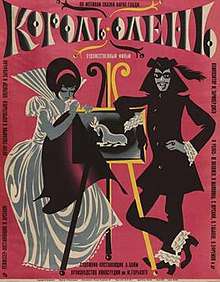King Stag
| King Stag | |
|---|---|
 | |
| Directed by | Pavel Arsenov[1] |
| Written by | Vadim Korostylyov |
| Starring |
Yury Yakovlev Valentina Malyavina Sergey Yursky |
| Music by | Mikael Tariverdiev |
| Cinematography | Inna Zarafyan |
| Edited by | Olga Katusheva |
Production company | |
Release date | 1969 |
Running time | 77 minutes |
| Country | Soviet Union |
| Language | Russian |
King Stag (Russian: Король-олень, translit. Korol-olen) is a feature film based on the play by Carlo Gozzi of the same name, shot at the Gorky Film Studio in 1969.[2] Musical theatrical tale. In the film, songs are played to the music of Mikael Tariverdiev performed by Alla Pugacheva, Yury Yakovlev, Sergei Yursky, Oleg Yefremov, Oleg Tabakov.[3] A classic of children's cinema in the USSR.[4][5]
Plot
Deramo, kind, but simple-hearted king of Serendippe, wishes to marry. But here's the problem: how to find out which of the contenders really loves Deramo, and which one simply counts on the royal throne? The wizard Durandarte gives the king a statue of a fool who laughs if someone says untruth. Outwardly, the idiot is similar to the favorite of the king by the first minister, the crafty and mean Tartaglia, who for a long time and unrequitedly was in love with Angela, the daughter of the second minister, Pantalone, a timid chinovopitaltsa. But she herself loves Deramo, although she does not want to go to the bride, considering them unnecessary and humiliating. Tartaglia plaits intrigues and in every possible way interferes with his daughter Clarice to marry young handsome chamberlain Leandra, brother of Angela, expecting to give her daughter for the king. Despite all the tricks of the first minister, the king, on the bride-show, under the audacity and sharpness of Angela, managed to discern love for him, falls in love with her and declares his wife. However, Tartaglia is unrelenting: on hunting, he learns from a friend the spell of Durandarte and changes his bodies with him.
Plot
- Yury Yakovlev as Deramo
- Valentina Malyavina as Angela (vocals Alla Pugacheva)[6]
- Sergey Yursky as Tartaglia
- Vladimir Shlesinger as Pantalone
- Oleg Tabakov as Chigolotti[6]
- Oleg Yefremov as Durandarte[6][7]
- Elena Solovey as Clarice
- Viktor Zozulin as Leander
- Vladimir Grammatikov as Zanni
- Alla Budnitskaya as Serendipist girl
Songs
- Cavatina Durandarte
- Cavatina Angela
- Duet of Angela and Pantalone
- Song of the Serendipist girls
- Duet of Deramo and Angela
- Tartaglia Aria
- Reply from Durandarte
- Ballad of Angela
- The duo Clarice and Leander
- A Song About Evil and Good Wizards
- Cavatina Chigolotti
- Song of the Guards
Criticism
If the viewer does not own an adequate film, the film remains incomprehensible already at the level of the translation. An example of such a blatant failure is the King Stag, a film of receptions, a movie film without filmmaking.[8]
In the already daring commedia dell'arte Carlo Gozzi, the future creator of the Guest from the Future introduced so many riddles, ambiguities and deliberate formalism that at times it is impossible to understand whether the actors (by the way, completely stars) embody their hidden fantasies, survive the reality of hallucinations or simply they are fooling around. What, for example, means a painting with a painted deer during his murder and why hunters ride on toy horses? But this seemed to Arsenov little, and he encrypted in the dialogues of characters the real relationship of the creators of the film. So, Yefremov-Durandarte rudely screams at Tabakov-Chigopotti during the action, and after all, that literally a month before the filming was headed by the theater, where Oleg was previously the main director, and was also not too shy in expressing his address. And the main fatal woman of the Soviet cinema Valentina Malyavina (Angela) ceased to be the wife of the director in the midst of filming, and so he decided to hastily remake the finale[6].
References
- ↑ Union of Workers of Cinematography of the USSR; Confederation of Unions of Cinematographers; Union of Cinematographers of the Russian Federation (2007). Iskusstvo Kino (in Russian). Publishing House of the Union of Workers of Cinematography of the USSR. p. 84. Retrieved 5 October 2018.
- ↑ Король-олень. Информация о фильме
- ↑ Король-олень. Х/ф, Russia-K
- ↑ Энциклопедия кино
- ↑ Сказочная киноопера «Король-олень»: Включи настроение
- 1 2 3 4 О фильме «Король-олень»
- ↑ Fyodor Razzakov. Олег Кинематограф – от «Айболита» до «Короля-оленя»
- ↑ Aleksei Leontyev. Прикладная психолингвистика речевого общения и массовой коммуникации